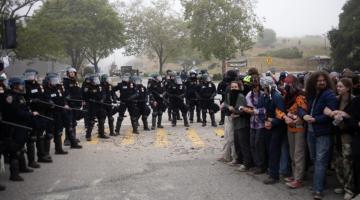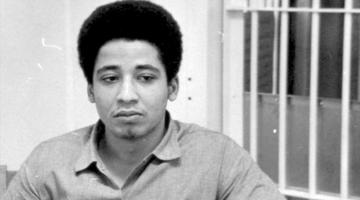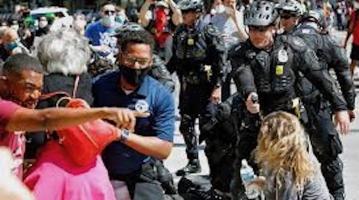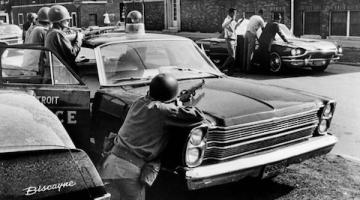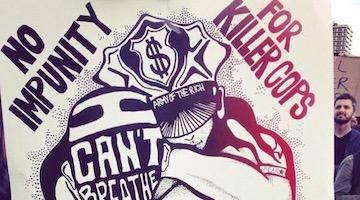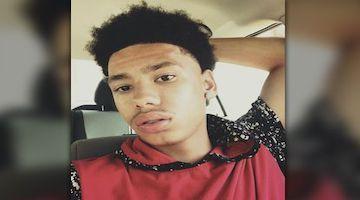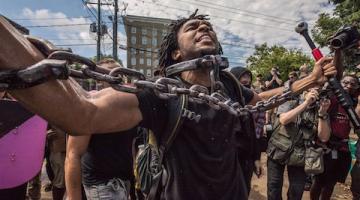Demonstrators are laying bare the deep pain that persists for black people fighting to live under the crushing weight of injustice that has long been at our necks.
“Too many ‘leaders wonder how we got here and what we can do to move forward, as if the answers have not been ever-present.”
In Minnesota, where black Americans account for 6% of the population but 14% of Covid-19 cases and 33% of Covid-19 deaths, George Floyd died at the hands of police.
“Please — I can’t breathe.”
He was a black man detained on suspicion of forgery, an alleged offense that was never litigated or even charged, but for which he received an extrajudicial death sentence.
“Please — I can’t breathe.”
He was only 46 years old.
“Please — I can’t breathe.”
And he was loved.
But despite onlookers’ pleas and his own calls of distress, with his face against the pavement, three officers on his back, and a knee in his neck, he was murdered.
“Please — I can’t breathe.”
While trained officers and paramedics stood by, and a horrified community witnessed, Floyd was denied the basic rights of due process and the basic dignity of life support.
“Please — I can’t breathe.”
In the wake of his public execution, uprisings have ignited in cities throughout the United States and the world, many of them led by young black people. Despite potential risks of exposure to Covid-19, demonstrators are laying bare the deep pain that persists for black people fighting to live under the crushing weight of injustice that has long been at our necks. The words “I can’t breathe” hang heavy in the air. But they are so much more than a rallying cry. They are indictments.
“Please — I can’t breathe.”
The truth is black people cannot breathe because police violence is a major cause of premature death, of stolen lives and stolen breaths in America. And it is a particularly deadly exposure for black Americans.
“Please — I can’t breathe.”
The truth is black people cannot breathe because as many mourn George Floyd, we also mourn Breonna Taylor and Tony McDade, and the nearly 1000 people who are killed by police each year, an outsized proportion of whom are black.
“Please — I can’t breathe.”
The truth is black people cannot breathe because we are preemptively grieving the 1 in 1000 black men and boys who will be killed by police.1
“Please — I can’t breathe.”
We are holding our children closer and tighter because we know black girls will be presumed to be older, less innocent, and less in need of protection than white girls as early as 5 years old,2 and black boys by 10 years old. We know the risks that may meet them when they leave our sides, and we hide our silent devastation when we prepare them for those risks — risks that no amount of guidance may deter.
“Please — I can’t breathe.”
The truth is black people cannot breathe because the legacies of segregation and white flight, practices of gentrification and environmental racism, and local zoning ordinances combine to confine us in residential areas where we are disproportionately exposed to toxins and pollutants. As a result, black populations have higher rates of asthma and cancer. And recent data suggest that chronic exposures to particulate matter in the air may contribute to a risk of death from Covid-19 as much as 15% higher for black Americans than that faced by white Americans.3
“Please — I can’t breathe.”
The truth is black people cannot breathe because we are currently battling at least two public health emergencies, and that is a conservative estimate. One of every 1850 black Americans have lost their lives in this global fight against a novel virus that could have harmed anyone (https://apmresearchlab.org. opens in new tab). And yet — because of racism and the ways humans use it to hoard resources and power for some, while depriving others — it has killed an enormous number of black people.
“Please — I can’t breathe.”
And black people are three times as likely to be killed by police as white people (https://mappingpoliceviolence.org. opens in new tab). Both these realities are acutely threatening black lives right now. But prevailing gaps in maternal and infant mortality have long threatened our survival beginning before we are even born.
“Please — I can’t breathe.”
In the face of literal gasps, as black communities bear the physical burdens of centuries of injustice, toxic exposures, racism, and white supremacist violence, too many either do not know what our communities endure or are aware but choose not to act. Too many “leaders” wonder how we got here and what we can do to move forward, as if the answers have not been ever-present.
We got here, as the sociologist Ruha Benjamin expertly notes, because “Racism is productive” (https://belonging.berkeley.edu/video-ruha-benjamin. opens in new tab). We got here because we live in a country established by indigenous dispossession and genocide. Because slavery and the racial ordering of humans and goods it established constructed a political economy predicated on devaluing black labor, demeaning black bodies, and denying black humanity. We got here because stolen lives and stolen breaths are profitable and we work in systems that continue to reap the gains.
“Please — I can’t breathe.”
Any solution to racial health inequities must be rooted in the material conditions in which those inequities thrive. Therefore, we must insist that for the health of the black community and, in turn, the health of the nation, we address the social, economic, political, legal, educational, and health care systems that maintain structural racism. Because as the Covid-19 pandemic so expeditiously illustrated, all policy is health policy.
We expect the deployment of these solutions to meet the urgency of this moment and the dire needs it has evidenced. We have confidence that these changes can be made rapidly, given the agility with which health care systems have reorganized in the face of Covid-19 — many establishing new practice patterns, payment models, and delivery mechanisms. The response to the pandemic has made at least one thing clear: systemic change can in fact happen overnight.
Although there is much to do, we recommend that health care systems engage, at the very least, in five practices to dismantle structural racism and improve the health and well-being of the black community and the country.
Divest from racial health inequities. Racial health inequities are not signs of a system malfunction: they are the by-product of health care systems functioning as intended. For example, the U.S. health insurance market enables a tiered and sometimes racially segregated health care delivery structure to provide different quality of care to different patient populations. This business model results in gaps in access to care between racial and ethnic groups and devastating disparities like those seen in maternal mortality. Universal single-payer health care holds the promise of removing insurance as a barrier to equitable care.
Desegregate the health care workforce. The health care workforce is predominantly white at essentially every level, from student and staff to CEO. This lack of diversity must be understood as a form of racial exclusion4 that affects the economic mobility and thus the health of nonwhite groups. For example, health care systems are often the economic engines and largest employers in their communities. Extending employment opportunities to those communities can extend the employer-based insurance pool, raise the median wage, support the local tax base, and counter the gentrification and residential segregation that often surrounds major medical centers — each of which improves population health.
Make “mastering the health effects of structural racism” a professional medical competency. In 2016, we asked individual clinicians to “learn, understand and accept America’s racist roots.”5 In 2020, it is clear that clinicians need to master learning the ways in which structural racism affects health. We believe that medical schools and training programs should equip every clinician, in every role, to address racism. And licensing, accreditation, and qualifying procedures should test this knowledge as an essential professional competency.
Mandate and measure equitable outcomes. Just as health care systems are required to meet rigorous safety and quality performance standards for accreditation, they should be required to meet rigorous standards for addressing structural racism and achieving equity in outcomes.
Protect and serve. Health care systems must play a role in protecting and advocating for their patients. Victims of state-sanctioned brutality are also patients, who may present with injuries or disabilities or mental health impairments, and their interests must be defended. Health care systems should also be on the forefront of advocating for an end to police brutality as a cause of preventable death in the United States. They should take a clear position that the disproportionate killing of black (and indigenous and Latinx) people at the hands of police runs counter to their commitment to ensuring the health, safety, and well-being of patients.
“Please — I can’t breathe.”
Police violence, racial inequities in Covid-19, and other forms of structural racism are concurrent and compounding public health crises in the United States.
“Please — I can’t breathe.”
Postmortem evidence indicates that George Floyd tested positive for Covid-19, underscoring this reality. The choice before the health care system now is to show, not tell, that Black Lives Matter.
Because, like George Floyd, black people are loved.
Author Affiliations: From the Division of Health Policy and Management, University of Minnesota School of Public Health (R.R.H.), Park Nicollet Clinic and the Department of Family Medicine and Community Health, University of Minnesota Medical School (E.M.M.) — all in Minneapolis; and the Palo Alto Medical Foundation, Palo Alto, CA (R.W.B.).
This article previously appeared in the New England Journal of Medicine.

